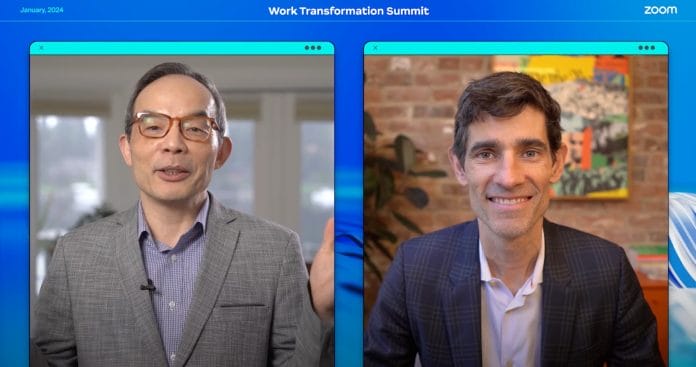It took 16 years for 100 million people to start using a mobile phone and seven years for 100 million people to start using the internet. In contrast, ChatGPT gained 100 million users in just three months.
The pace of innovation and adoption of generative AI has been unprecedented. This puts organisations in the position of evaluating and adopting this new technology quickly but also responsibly and strategically. But there are a lot of questions about AI, including how it will affect our workforce and our lives.
Our recent Work Transformation Summit sought to untangle some of these unknowns and demystify the conversation around AI. Zoom’s chief technology officer, Xuedong “XD” Huang, chatted with Nick Thompson, CEO of The Atlantic, about AI’s impact on society. Here are some insights from their keynote discussion — watch Work Transformation Summit on demand for the full conversation.
Can AI make the world more equitable?
Many technological advances over the past few decades have benefited a select few: those who are tech-savvy, who can afford to learn and own new technologies, or whose jobs and lifestyles allow them to take advantage of things like hybrid work. It’s possible that AI could have the opposite effect, helping to distribute knowledge and productivity gains more equitably.
“One of the questions I’m most interested in is whether AI will make the world more equal or less equal,” Nick said. He described a situation where a group of people go to a work meeting. Executives may have assistants to take notes for them and other people may get print-outs, while an individual contributor may not have those resources available and have to take their own notes. “With AI, it’s a little more democratised. Everybody can get an AI meeting summary readout,” he said.
However, the cost of some AI tools can make it difficult for companies to give access to all their employees. “A CTO of a bigger corporation told me that they only purchased licenses for the company’s executives because of the cost. This creates more inequality and even resentment,” XD said. He noted that Zoom AI Companion, which is included at no additional cost*, makes AI more accessible for organisations of all sizes so AI can be available to more of their employees.
The benefits of AI can help level the playing field in other ways, as well. As XD pointed out, language barriers can hold teams back from communicating effectively with each other.
“Equality is multidimensional,” XD said. “When you are meeting with people who don’t all speak the same language, AI Companion can help bridge the gap and help people communicate better.”
AI Companion’s real-time translation, along with the ability to receive meeting summaries and ask questions about the meeting in 33 different languages, helps provide a more inclusive experience for global teams. And AI Companion’s ability to automatically detect the language being spoken in a meeting and generate a meeting summary or answer questions about the meeting in that language (coming later this month) makes it even easier to have a more equitable experience.
Can AI make humans more creative?
AI innovation expert Pascal Bornet once noted that AI can help humans with repetitive tasks, giving us more time to spend on creative pursuits. However, AI is often used for writing and image generation, which previously required humans to put in creative effort. With all these AI-powered tools at our disposal, some are wondering: does AI make us more or less creative?
“With the great summarisation technology of AI, the ability for everybody to catch up and be more equal in a meeting, do you think there’s a possibility that it leads to not just more productivity, but more creativity?” Nick asked.
The answer may be less about AI outputs themselves and more about the conditions that AI can provide to allow creativity to flourish.
“Creativity comes from putting people in a comfortable environment. They can really connect, they can see things they missed,” XD said. “So what generative AI can do is bridge that gap to bring people together, so they can innovate together.”
Will AI affect how we connect socially?
AI has replaced or altered many of the tasks humans used to spend time on. Instead of taking meeting notes, we might be able to focus more on the conversation itself and supplement our experience with an AI-generated meeting summary. Instead of drafting an email ourselves, we might ask AI Companion to help us compose a message draft. But at what point does AI affect how we connect as social creatures?
Nick brought up the fact that meeting summaries might prevent people from chit-chatting about their day or having fun side conversations. “Maybe that’s good because I’ll get to business sooner, and maybe it’s bad because there’s a little less social connection,” he said.
With meeting summaries, chat and email composition, smart recordings, and many other AI capabilities helping us be more efficient with our time, Nick questioned whether it will ever be possible for AI to replace meetings entirely.
“I believe people are social animals,” XD responded. “To have the ability and the luxury to connect with people, real people, is a privilege. We have to cherish those moments.”
*Note: AI Companion is available at no additional cost to Zoom customers with the paid services assigned to their Zoom user account. AI Companion may not be available for all regions and industry verticals.
This Opinion Piece was contributed by Zoom Video Communications and written by its Head of AI Mahesh Ram.









